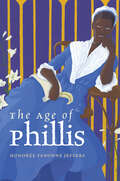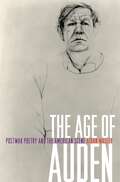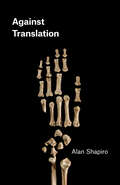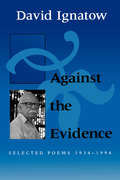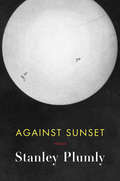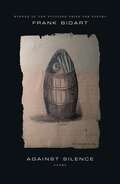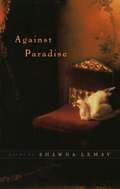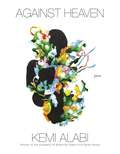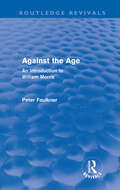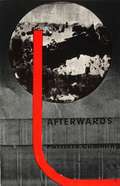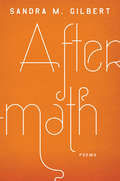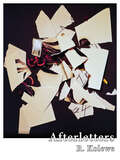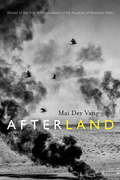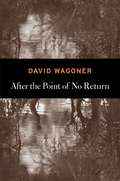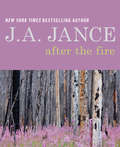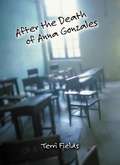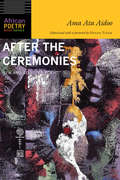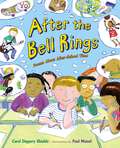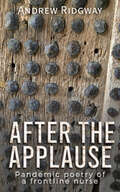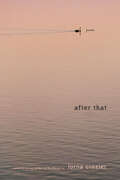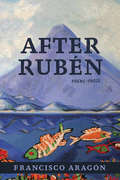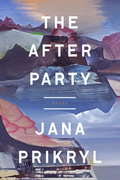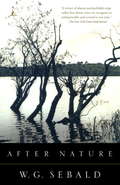- Table View
- List View
The Age of Phillis (Wesleyan Poetry Series)
by Honorée Fanonne JeffersIn 1773, a young, African American woman named Phillis Wheatley published a book of poetry that challenged Western prejudices about African and female intellectual capabilities. Based on fifteen years of archival research, The Age of Phillis, by award-winning writer Honorée Fanonne Jeffers, imagines the life and times of Wheatley: her childhood in the Gambia, West Africa, her life with her white American owners, her friendship with Obour Tanner, and her marriage to the enigmatic John Peters. Woven throughout are poems about Wheatley's "age"—the era that encompassed political, philosophical, and religious upheaval, as well as the transatlantic slave trade. For the first time in verse, Wheatley's relationship to black people and their individual "mercies" is foregrounded, and here we see her as not simply a racial or literary symbol, but a human being who lived and loved while making her indelible mark on history.mothering #1Yaay, Someplace in the Gambia, c. 1753afterthe after-birthis deliveredthe mother stopsholding her breaththe mid-wife giveswhat came beforeher just-washed painher insanity painan undeserved paina God-given painoh oh oh paindrum-talking painwitnessing painAllaha mother offersYou this giftprays You findit acceptableher living painher creature painher pretty-little-babypain
The Age of Auden: Postwar Poetry and the American Scene
by Aidan WasleyHow W. H. Auden’s emigration to the United States changed the course of postwar American poetryW. H. Auden's emigration from England to the United States in 1939 marked more than a turning point in his own life and work—it changed the course of American poetry itself. The Age of Auden takes, for the first time, the full measure of Auden's influence on American poetry. Combining a broad survey of Auden's midcentury U.S. cultural presence with an account of his dramatic impact on a wide range of younger American poets—from Allen Ginsberg to Sylvia Plath—the book offers a new history of postwar American poetry.For Auden, facing private crisis and global catastrophe, moving to the United States became, in the famous words of his first American poem, a new "way of happening." But his redefinition of his work had a significance that was felt far beyond the pages of his own books. Aidan Wasley shows how Auden's signal role in the work and lives of an entire younger generation of American poets challenges conventional literary histories that place Auden outside the American poetic tradition. In making his case, Wasley pays special attention to three of Auden's most distinguished American inheritors, presenting major new readings of James Merrill, John Ashbery, and Adrienne Rich. The result is a persuasive and compelling demonstration of a novel claim: In order to understand modern American poetry, we need to understand Auden's central place within it.
Against Translation (Phoenix Poets)
by Alan ShapiroWe often ask ourselves what gets lost in translation—not just between languages, but in the everyday trade-offs between what we experience and what we are able to say about it. But the visionary poems of this collection invite us to consider: what is loss, in translation? Writing at the limits of language—where “the signs loosen, fray, and drift”—Alan Shapiro probes the startling complexity of how we confront absence and the ephemeral, the heartbreak of what once wasn’t yet and now is no longer, of what (like racial prejudice and historical atrocity) is omnipresent and elusive. Through poems that are fine-grained and often quiet, Shapiro tells of subtle bereavements: a young boy is shamed for the first time for looking “girly”; an ailing old man struggles to visit his wife in a nursing home; or a woman dying of cancer watches her friends enjoy themselves in her absence. Throughout, this collection traverses rather than condemns the imperfect language of loss—moving against the current in the direction of the utterly ineffable.
Against the Tide: The Story of Watchman Nee
by Angus KinnearThe engrossing, moving biography of one of China's better-known Christians, the dedicated evangelist and gifted Bible teacher Watchman Nee.
Against the Evidence: Selected Poems, 1934–1994 (Wesleyan Poetry Series)
by David IgnatowFor over half a century, David Ignatow has crafted spare, plain, haunting poetry pf working life, urban images, and dark humor. The poetic heir of Whitman and William Carlos Williams, Ignatow is characteristically concerned with human mortality and human alienation in the world: the world as it is, defined by suffering and despair, yet at crucial times redeemed by cosmic vision and shared lives. His development as a poet is chronicled in Against the Evidence, title of the poem in part quoted above and meant by Ignatow as the metaphor for the whole body of his work.Where his previous collections have been organized thematically, Ignatow here arranges his poems "according to the decade in which they were written…returning each to its chronological order." Against the Evidence charts the evolution of his themes from the earliest origin in the Thirties to their present extraordinary manifestation in a variety of poetic forms and modes.
Against Sunset: Poems
by Stanley PlumlyA powerful new volume from the National Book Award finalist that demonstrates how the lyric is essentially elegiac. Whether addressing the deaths of friends and other poets or celebrating the closing of the day and the autumn of the seasons, Against Sunset reveals Stanley Plumly at his most personal and intimate. As much an homage to the rich tradition of the Romantics as it is a meditation on memory itself, these poems live at the edges of disappearances. From "Against Sunset" The horizon, halfway disappeared between above and below-- night falls too or does it also rise out of the death-glitter of water? And if night is the long straight path of the full moon pouring down on the face of the deep, what makes us wish we could walk there, like a flat skipped stone?
Against Silence: Poems
by Frank BidartAn urgent new collection from the winner of the Pulitzer Prize and the National Book Award and “one of the undisputed master poets of our time” (Craig Morgan Teicher, NPR)Words, voices reek of the worlds from which theyemerge: different worlds, each with its all but palpablearoma, its parameters, limitations, promise.Words—there is a gap, nonetheless alwaysand forever, between words and the world—slip, slide, are imprecise, BLIND, perish. •Set up a situation,—. . . then reveal an abyss.For more than fifty years, Frank Bidart has given voice to the inner self, to the depths of his own psyche and the unforgettable characters that populate his poems. In Against Silence, the Pulitzer Prize winner’s eleventh collection of poetry, Bidart writes of the cycles we cannot escape and the feelings we cannot forget. Our history is not a tabula rasa but a repeating, refining story of love and hate, of words spoken and old cruelties enacted. Moving among the dead and the living, the figures of his life and of his past, Bidart calls reality forth—with nothing settled and nothing forgotten, we must speak.
Against Paradise
by Shawna LemayShawna Lemay’s rich, amused, insistent, ingenious meditation on Venice will surprise readers with its peculiar grace. Here is the work of an elegant raconteur; a self-effacing, sharp-eared occupier of voices; a high-toned, compassionate gossip. From many mouths, she offers us the city, doomed, full of light. Lemay’s Venice is a small, crowded community of the delightfully eccentric dead. Through her quirky dramatic monologues, each one shimmering with a companionable intelligence, we meet them – George Eliot, Peggy Guggenheim, Lord Byron, Mary Shelley, Effie Ruskin, Ernest Hemingway, Titian, various unnamed others; we meet them in mid-speech; it seems they have never stopped talking, talking, telling now (or refusing still to tell) their secrets, protecting their vanities still, finally saying what they truly think. Lemay has given us an entire world, dark, haughty, watery, beautiful, full of voices, sedimented with stories.
Against Heaven: Poems
by Kemi AlabiWinner of the Academy of American Poets First Book Award, selected by Claudia Rankine. Kemi Alabi’s transcendent debut reimagines the poetic and cultural traditions from which it is born, troubling the waters of some of our country’s central and ordained fictions—those mythic politics of respectability, resilience, and redemption. Instead of turning to a salvation that has been forced upon them, Alabi turns to the body and the earth as sites of paradise defined by the pleasure and possibility of Black, queer fugitivity. Through tender love poems, righteous prayers, and vital provocations, we see the colonizers we carry within ourselves being laid to rest.Against Heaven is a praise song made for the flames of a burning empire—a freedom dream that shapeshifts into boundless multiplicities for the wounds made in the name of White supremacy and its gods. Alabi has written an astonishing collection of magnificent range, commanding the full spectrum of the Black, queer spirit’s capacity for magic, love, and ferocity in service of healing—the highest power there is.
Against The Age: An Introduction to William Morris (Routledge Revivals)
by Peter FaulknerStudents new to the work of William Morris will find the full range of his achievements covered in this reissue of Peter Faulkner's excellent biography, first published in 1980. The author has carefully placed Morris in the context of the Victorian age, but has also suggested the relevance of his ideas today. The six chapters are organised biographically and cover all aspects of Morris’s work in poetry, fiction, design and socialist politics. The emphasis is on his continuous struggle against the age in which he lived, seen as an idealism which went through various stages from the wistfulness of The Earthly Paradise through the practical activities of the firm of Morris & Company to the socialism of Morris's later years. The book quotes freely from writings by Morris which are not easily accessible and gives an overall account from which the student can develop his specialist interests. This reissue will appeal to sixth-formers and undergraduates interested in the Victorian period, as seen through one of its most striking personalities. When this book appeared in 1980, Morris’s reputation had risen again after the low estimates of the interwar period. This was due both to the reappraisal of his politics and to the expanding popularity of his designs. Against the Age offers a clear account of Morris’s career for those developing an interest in his numerous achievements. It covers the whole range of Morris’s work, and argues for his significance as a writer of both poetry and prose. Since 1980 our knowledge of Morris has been enriched by the publication of Norman Kelvin’s edition of his Collected Letters, by the late Nicholas Salmond’s editions of his contributions to the socialist journals, by Fiona MacCarthy’s biography of 1984, and by the increasing recognition of Morris as a pioneer of environmentalism. However, the book retains its value for its wide coverage and its balanced attitude to Morris’s achievements, and for its encouragement to readers to consider the issues that make Morris of continuing importance today.
Afterwards
by Patricia Cumming"All the poems are about survival. Patricia Cumming speaks with unblinking carefulness." --New: American and Canadian Poetry
Aftermath: Poems
by Sandra M. Gilbert"Sandra Gilbert's poems are beautifully situated at the intersection of craft and feeling."--Billy Collins The title of this collection--at times mournful, sardonic, and joyous--refers to the grief in the wake of loss. Yet these poems aren't just about the consequences of loss but also about the complex experiences of endurance, acquiescence, and rebirth that, with luck, mark the aftermath of sorrow. from "Aftermath: Kite" But the thought is only paper after all, a soul that clings to a stick, tears open, shreds as if it's flung to the ground in a final shiny fall, and at last the line goes limp, the climbing ends. Beyond the rush & sweep, an arc of silence-- though a mind imagined this flight, & proved it once.
Afterletters
by R. KoleweLovers wrote letters. Letters crossed absence, longing, joy, passion, loss and heartbreak. Sometimes letters were answered. Sometimes not. And sometimes not for years, but then – In 1948, in the exhausted aftermath of WWII, the poets Paul Celan and Ingeborg Bachmann met in Vienna. They began a difficult and intense but intermittent relationship which lasted until the early 1960s, broken off only when Bachmann could no longer deal with Celan's increasing mental instability. And yet, despite the break, the relationship continued to haunt both of them.In Afterletters, R. Kolewe weaves together fragments of letters and other works of these two poets, to give us a stunning sequence of poems that explore the traces of loss and love, in language that breaks, recombines and scintillates, "star-crossed, star-covered, star-thrown."
Afterland: Poems
by Mai Der VangThe 2016 winner of the Walt Whitman Award of the Academy of American Poets, selected by Carolyn ForchéWhen I make the crossing, you must not be taken no matter whatthe current gives. When we reach the camp,there will be thousands like us.If I make it onto the plane, you must follow me to the roadsand waiting pastures of America.We will not ride the water today on the shoulders of buffaloas we used to many years ago, nor will we foragefor the sweetest mangoes.I am refugee. You are too. Cry, but do not weep.—from “Transmigration”Afterland is a powerful, essential collection of poetry that recounts with devastating detail the Hmong exodus from Laos and the fate of thousands of refugees seeking asylum. Mai Der Vang is telling the story of her own family, and by doing so, she also provides an essential history of the Hmong culture’s ongoing resilience in exile. Many of these poems are written in the voices of those fleeing unbearable violence after U.S. forces recruited Hmong fighters in Laos in the Secret War against communism, only to abandon them after that war went awry. That history is little known or understood, but the three hundred thousand Hmong now living in the United States are living proof of its aftermath. With poems of extraordinary force and grace, Afterland holds an original place in American poetry and lands with a sense of humanity saved, of outrage, of a deep tradition broken by war and ocean but still intact, remembered, and lived.
After the Point of No Return
by David Wagoner"Wagoner's words are a living link to the world, enacting it so vitally that they feel like natural facts."-The Seattle TimesIn his twenty-fourth book of poetry, David Wagoner reflects on youth, love, regret, and expectation versus reality. Here a master writes at top form, back-dropped by life's curious moments and imagining Jesus as an untidy roommate or considering our final destination in "Beginner's Guide to Death.""After the Point of No Return"After that moment when you've lost all reasonfor going back where you started, when going aheadis no longer a Yes or No, but a matter of fact,you'll need to weigh, on the one hand, what will seem,on the other, almost nothing against somethingslightly more than nothing and must chooseagain and again, at points of fewer and fewerchances to guess, when and which way to turn.That's when you might stop thinking about starsand storm clouds, the direction of wind,the difference between rain and snow, the time of day or the lay of the land, about which treesmean water, which birds know what you needto know before it's too late, or what's right hereunder your feet, no longer able to tell youwhere it was you thought you had to go.David Wagoner is the author of two dozen books of poetry and ten novels. A longtime teacher at University of Washington, he was the editor at Poetry Northwest. He lives in Seattle, Washington.
After the Fire
by J. A. JanceNew York Times bestselling author J. A. Jance's heartrending collection of poetry and essays recounts a dark chapter of her own life, her first marriage to an alcoholic--a powerful look at the emotional cost of addiction and an inspiring story of courage and triumph in the wake of crushing defeatBefore she found fame as a bestselling mystery author, Judith Jance wrestled with the anguish of being married to an alcoholic. For years she channeled her pain into words, composing the poems in this moving volume, first published in 1984, a year before her debut novel. In searing and direct language, After the Fire chronicles the collapse of Jance's first marriage under the weight of her husband's addiction--and her own unwitting denial and codependence while she struggled to find herself. "I will not be the price of your redemption," she wrote then. "I will not pay my life to ransom yours. "An intimate, deeply personal look into a wrenching time in Jance's life, After the Fire is a portrait of addiction and its insidious effects on lives and love. It illuminates universal truths about unbearable loss and finding the courage to carry on, and offers inspiration and profound insight into the heart and work of a beloved bestselling author.
After the Death of Poetry: Poet and Audience in Contemporary America
by Vernon ShetleyIn this deft analysis, Vernon Shetley shows how writers and readers of poetry, operating under very different conventions and expectations, have drifted apart, stranding the once-vital poetic enterprise on the distant margins of contemporary culture. Along with a clear understanding of where American poetry stands and how it got there, After the Death of Poetry offers a compelling set of prescriptions for its future, prescriptions that might enable the art to regain its lost stature in our intellectual life.In exemplary case studies, Shetley identifies the very different ways in which three postwar poets--Elizabeth Bishop, James Merrill, and John Ashbery--try to restore some of the challenge and risk that characterized modernist poetry's relation to its first readers. Sure to be controversial, this cogent analysis offers poets and readers a clear sense of direction and purpose, and so, the hope of reaching each other again.
After the Death of Anna Gonzales
by Terri FieldsPoems written in the voices of forty-seven people, including students, teachers, and other school staff, record the aftermath of a high school student's suicide and the preoccupations of teen life.
After the Ceremonies: New and Selected Poems (African Poetry Book)
by Ama Ata Aidoo Helen YitahAma Ata Aidoo is one of the best-known African writers today. Spanning three decades of work, the poems in this collection address themes of colonialism, independence, motherhood, and gender in intimate, personal ways alongside commentary on broader social issues. After the Ceremonies is arranged in three parts: new and uncollected poems, some of which Aidoo calls “misplaced or downright lost”; selections from Aidoo’s An Angry Letter in January and Other Poems; and selections from Someone Talking to Sometime. Although Aidoo is best known for her novels Changes: A Love Story and Our Sister Killjoy, which are widely read in women’s literature courses, and her plays The Dilemma of a Ghost and Anowa, which are read and performed all over the world, her prowess as a poet shines in this collection.
After the Bell Rings: Poems About After-School Time
by Carol Diggory ShieldsFresh, funny, and full of verve and variety, this clever book of 22 illustrated poems about school captures what kids love to do when class lets out. “Finally…. Finally…. Finally…. BRINNNNNG!That wonderful bell begins to ring. “Everyone knows that the best part of the school day is the moment it ends! After school, kids can hang out with their friends, play video games, attend music lessons, avoid chores, practice sports, do homework...well, maybe that last part isn't so great, but the rest is a blast!
After the Applause: Pandemic poetry of a frontline nurse
by Andrew Ridgway'Blurb' Contained within, Poetic words, some grim, of my recent experiences, during these times mysterious, of love and loyalty, and life’s’ great frailties, words of understanding, and observations on society, I share all this with you, humor, tears, happiness, fears, nakedly I bear my soul, for you to read, because we all need to forgive ourselves in times like these.
After That: Poems
by Lorna CrozierFrom Lorna Crozier, the poet that Ursula Le Guin called a &“truth teller&” and &“visionary,&” comes this new collection of soul-stirring poems that follow the death of a loved one.After That is a book written from the dark hollow we fall into when we lose those we love. Lorna Crozier&’s sure poetry finds the words to engage with the grief that comes from the death of her partner, the writer Patrick Lane, whom she&’d lived with for forty years, many of them tumultuous. With grace and precision, she illuminates sorrow. The light the poems cast travels far enough to reach anyone who has experienced loss. These pages engage us with many familiar yet magical things—not only paper wasps, but their libraries; not only herons, but their role as aging monks. Crozier takes us through the domestic and natural worlds into the cagey and metaphysical place we call the beyond. Without offering false comfort, the poems turn over our own grief so that we can catch a glimpse of the new life inside us again.
After Rubén: Poems + Prose
by Francisco AragónThis collection of poetry, prose, and translations explores Latinx and queer identity through homage to the great Nicaraguan poet Rubén Darío.After Rubén unfolds a decades-long journey braiding together the personal, the political and the historical. Throughout the text, acclaimed poet Francisco Aragon intersperses English-language translations and riffs of the Spanish-language master Rubén Darío. Whether it’s biting portraits of public figures, or nuanced sketches of his father, Francisco Aragón has assembled his most expansive collection to date, evoking his native San Francisco, but also imagining ancestral spaces in Nicaragua.Readers will encounter pieces that splice lines from literary forebearers, a moving elegy to a sibling, a surprising epistle from the grave. In short, After Rubén presents a complex and fascinating conversation surrounding poetry in the Americas—above all as it relates to Latinx and queer poetics.
The After Party: Poems
by Jana Prikryl"A truly moving book." --John AshberyJana Prikryl's The After Party journeys across borders and eras, from cold war Central Europe to present-day New York City, from ancient Rome to New World suburbs, constantly testing the lingua francas we negotiate to know ourselves. These poems disclose the tensions in our inherited identities and showcase Prikryl's ambitious experimentation with style."Thirty Thousand Islands," the second half of the collection, presents some forty linked poems that incorporate numerous voices. Rooted in one place that fragments into many places--the remote shores of Lake Huron in Canada, a region with no natural resources aside from its beauty--these poems are an elegy that speaks beyond grief.Penetrating, vital, and visionary, The After Party marks the arrival of an extraordinary new talent.From the Trade Paperback edition.
After Nature
by W. G. SebaldAfter Nature, W. G. Sebald's first literary work, now translated into English by Michael Hamburger, explores the lives of three men connected by their restless questioning of humankind's place in the natural world. From the efforts of each, "an order arises, in places beautiful and comforting, though more cruel, too, than the previous state of ignorance." The first figure is the great German Renaissance painter Matthias Grünewald. The second is the Enlightenment botanist-explorer Georg Steller, who accompanied Bering to the Arctic. The third is the author himself, who describes his wanderings among landscapes scarred by the wrecked certainties of previous ages. After Nature introduces many of the themes that W. G. Sebald explored in his subsequent books. A haunting vision of the waxing and waning tides of birth and devastation that lie behind and before us, it confirms the author's position as one of the most profound and original writers of our time.
